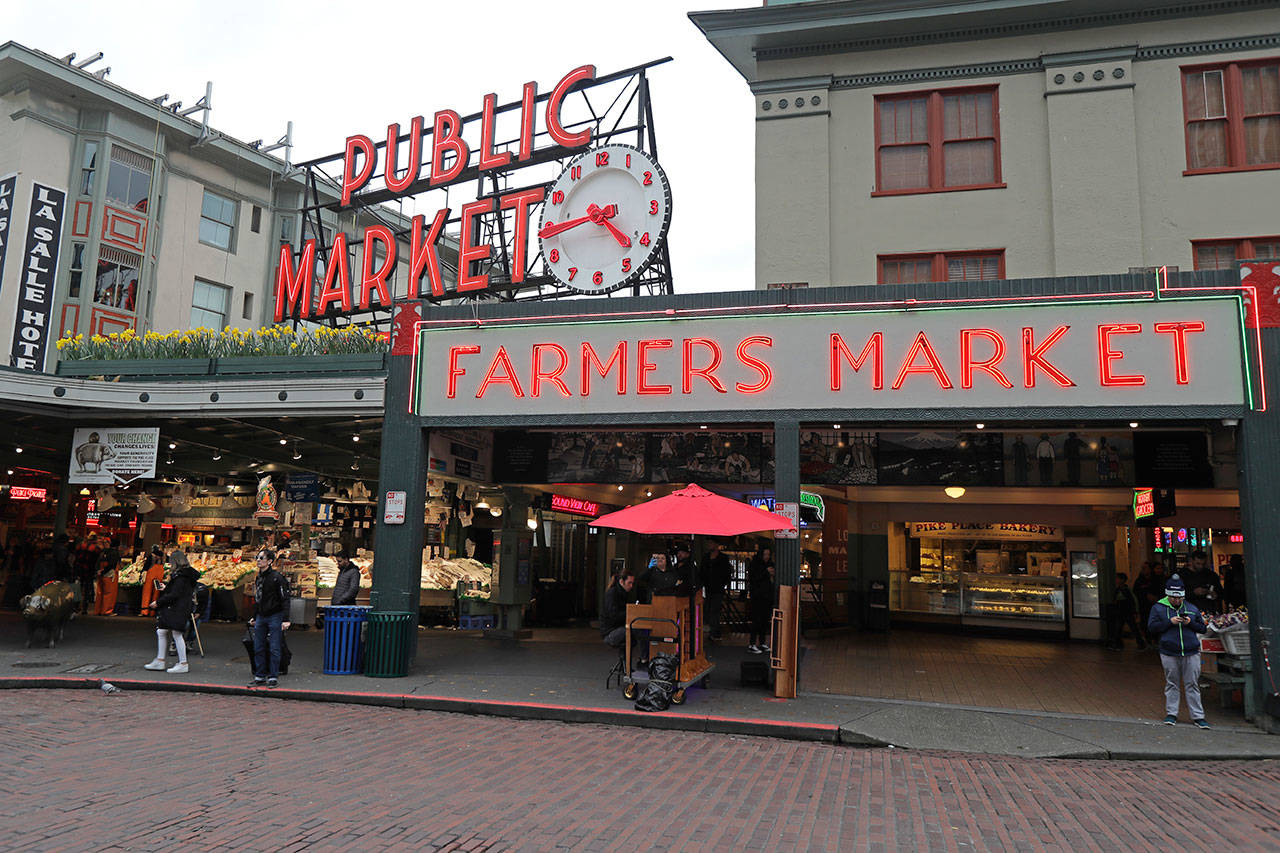By Rachel Lerman and Gene Johnson
The Associated Press
SEATTLE — The coronavirus outbreak has largely emptied Seattle’s usually busy downtown streets after Amazon and other companies told tens of thousands of people to work from home. That means far fewer customers for restaurants, shops and other businesses.
The Seattle area is dealing with the worst COVID-19 outbreak in the country, with at least 24 deaths, and businesses are bracing for the cascading effect of losing customers for the foreseeable future. Hotel bookings dropped as big conventions, including the Emerald City Comic Con, were canceled or postponed.
“You can see it and feel it on the streets. You can see it in restaurants and hotel lobbies,” said Jon Scholes, president and CEO of the Downtown Seattle Association.
Scholes said the downtown street outside his window was nearly completely empty late last week. He watched a normally crowded bus drive by with almost no passengers.
The Whole Foods Market in the heart of Amazon’s Seattle campus also was barely filled with customers Monday morning, when lines of shoppers usually crowd checkout lines.
In addition to Amazon, other employers have told people to telecommute. Amazon, however, has said it will keep paying the hourly workers who staff many food, cleaning and other services on its campuses even while they are largely empty. The tech giant has become the poster child of rising rents and increasing income inequality in Seattle — but Amazon’s tens of thousands of employees also make up a huge portion of customers for small shops and restaurants who rely on their business to stay afloat.
In Seattle’s famed Pike Place Market, foot traffic has slowed enough that sales have dropped about 30 percent from last year’s numbers at popular breakfast and lunch spot Bacco Cafe, owner Heong Park said.
Park’s two restaurants in the market — Bacco and Chan — are hurting. But Park is optimistic people will start emerging from their homes after getting over the initial shock of the virus spreading in their community.
At his third restaurant, Meet Korean BBQ, in Seattle’s nearby Capitol Hill neighborhood, the after-work rush has slowed, but people are still coming for later dinners.
Much of the concern is for businesses that operate in the massive shadow of Amazon’s corporate headquarters. The company said it will help cover one month’s rent for small businesses in its buildings and announced Tuesday that it would set up a $5 million relief fund for restaurants and shops near its South Lake Union headquarters. The fund will give small businesses cash grants to help make up lost revenue and pay employees as Amazon workers stay home.
The long lunchtime line has evaporated at Tacos El Tajin, a bright green taco truck that parks on weekdays in the heart of Amazon’s headquarters. Owner Tomas Lopez said business has dropped around 75 percent in recent days.
“We’re going to have to go find another location for now and wait for all the big companies to come back to work,” he said. “Maybe a construction site or something like that.”
Without Amazon customers, some businesses might be forced to shut down if they don’t get relief, said University of Washington marketing professor Jeff Shulman, who has studied the effect of Amazon on the city’s economy.
“Rent is still due, insurance is still due, it’s really expensive to operate a space in downtown, and you’d have to anticipate the revenues are not going to be there,” he said.
And if restaurants and stores are forced to close — even temporarily — it means many hourly workers will not get paid and could struggle to afford rent and other necessities in the increasingly expensive city, Shulman said.
“If the money is not there, it could be really problematic on people already struggling,” he said.
Hotels are seeing a 30 percent to 40 percent drop in occupancy, said tourism organization Visit Seattle, and cultural attractions and events are reporting “steep declines.”
A coalition of businesses and other groups, including Microsoft, Amazon, Starbucks and the city of Seattle, created a fund to benefit economically vulnerable groups. It has $2.5 million in donations, largely from Amazon and Microsoft, and will give grants to groups that work with gig workers, health care workers, communities of color, people without access to paid health care and others.
Business groups are trying to get temporary relief for businesses and employees before the situation gets more dire.
The Seattle Metropolitan Chamber of Commerce, Downtown Seattle Association and other organizations sent a letter to Gov. Jay Inslee and state lawmakers last week asking for the government to explore expanding unemployment insurance to cover part-time workers and set up an emergency fund to help small businesses.
Inslee announced new rules Tuesday that would allow workers to receive unemployment benefits if an employer needs to temporarily reduce or shut down operations because a worker is sick with COVID-19 and others need to be isolated or quarantined. A worker who falls seriously ill and has to quit also can now qualify for paid medical leave.
Inslee said he has directed state agencies to expand options for employees affected by COVID-19 to telecommute and for those who have to self-quarantine but can’t work from home to be eligible for up to 14 days of pay.
“The suite of these policies are really going to help people weather this economically,” the governor said.
